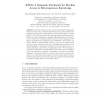125
click to vote
CNL
2009
14 years 12 months ago
2009
Semantic wikis support the collaborative creation, editing and utilization of semantically-enriched content, and they may therefore be wellsuited to addressing problems associated ...
127
click to vote
SEMWEB
2010
Springer
14 years 12 months ago
2010
Springer
Abstract. Wikis allow users to collaboratively create and maintain content. Semantic wikis, which provide the additional means to annotate the content semantically and thereby allo...
148
click to vote
RR
2010
Springer
15 years 14 days ago
2010
Springer
Semantic wikis and other modern knowledge management systems deviate from traditional knowledge bases in that information ranges from unstructured (wiki pages) over semi-formal (ta...
123
click to vote
JUCS
2010
15 years 15 days ago
2010
: In the paper application of semantic wikis as knowledge engineering tool in a collaborative environment is considered. Selected aspects of semantic wikis are discussed. The main ...
101
click to vote
NRHM
2008
15 years 2 months ago
2008
In the same way that Wikis have become the mechanism that has enabled groups of users to collaborate on the production of hypertexts on the web, Semantic Wikis promise a future of...
129
click to vote
SEMWIKI
2008
15 years 3 months ago
2008
This paper details the main concepts and the architecture of UfoWiki, a semantic wiki farm
125
click to vote
LWA
2008
15 years 3 months ago
2008
A couple of semantic wikis have been proposed to serve as collaborative knowledge engineering environments
116
click to vote
WWW
2010
ACM
15 years 6 months ago
2010
ACM
KiWi is a semantic Wiki that combines the Wiki philosophy of collaborative content creation with the methods of the Semantic Web in order to enable effective knowledge management...
137
click to vote
DEXA
2009
Springer
15 years 6 months ago
2009
Springer
Abstract. Wikis have demonstrated how it is possible to convert a community of strangers into a community of collaborators. Semantic wikis have opened an interesting way to mix web...
144
click to vote
ESWS
2007
Springer
15 years 8 months ago
2007
Springer
Collaborative work environments for scientific knowledge have many applications in research as well as in education. Such systems already exist (e.g. Wikipedia and PlanetMath), b...


